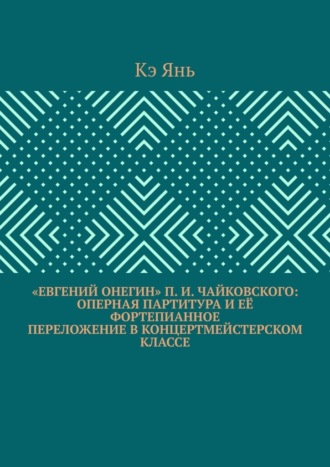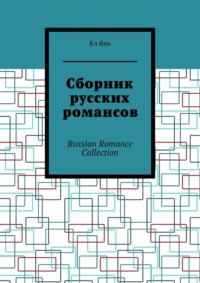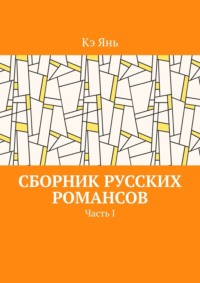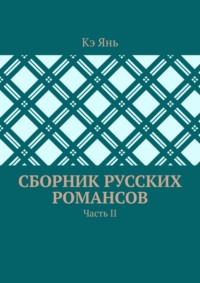
Полная версия
«Евгений Онегин» П. И. Чайковского: оперная партитура и её фортепианное переложение в концертмейстерском классе

«Евгений Онегин» П. И. Чайковского: оперная партитура и её фортепианное переложение в концертмейстерском классе
Кэ Янь
© Кэ Янь, 2025
ISBN 978-5-0067-8423-9
Создано в интеллектуальной издательской системе Ridero
«Евгений Онегин» П. И. Чайковского: оперная партитура и её фортепианное переложение в концертмейстерском классе
Министерство культуры Российской Федерации
ФГБОУ ВО «Санкт-Петербургская государственная консерватория
имени Н. А. Римского-Корсакова»
___________________________________________________
Кафедра концертмейстерского мастерства
Выпускная квалификационная работа (реферат)
по специальности 53.09.01 Искусство музыкально-инструментального исполнительства
(концертмейстерское исполнительство на фортепиано) (уровень подготовки кадров высшей квалификации)
Квалификация: Артист высшей квалификации.
Преподаватель творческих дисциплин в высшей школе
Руководитель – Доктор искусствоведения, профессор.
Директор СПБ отделения Рахманиновского общества России.
Заслуженный работник Высшей школы РФ.
Скафтымова Людмила Александровна
Санкт-Петербург
2019
Ministry of Culture of the Russian Federation
Federal State Budgetary Educational Institution of Higher Education
«N. A. Rimsky-Korsakov Saint Petersburg State Conservatory»
_____________________________________________________
Department of Collaborative Piano (or Piano Accompaniment)
«Eugene Onegin» P. I. Tchaikovsky:
Opera Score and Its Piano Reduction
in the Collaborative Piano Class
Graduate Thesis (Abstract)
in the specialty 53.09.01 Art of Musical Instrumental Performance
(Collaborative Piano Performance) (Highest Qualification Personnel Training Level)
Qualification: Highest Qualification Rank Performer
Professor of Artistic Disciplines in Higher Education
Supervisor —
Doctor of Arts (D.Sc. in Arts), Professor.
Director, St. Petersburg Branch of the Rachmaninoff Society of Russia.
Honored Educator of Higher Education of the Russian Federation.
Lyudmila Alexandrovna Skaftymova
Saint Petersburg
2019
ОГЛАВЛЕНИЕ-TABLE OF CONTENTS
Введение
Introduction
Актуальность темы
Relevance of the Topic
Глава I. Опера «Евгений Онегин» в историко-теоретическом аспекте
Chapter I. Eugene Onegin in Historical-Theoretical Context
– История создания оперы «Евгений Онегин»
History of the Opera’s Creation
– Характеристика либретто и музыкального комплекса
Libretto Analysis and Musical Structure
Глава II. «Евгений Онегин» в концертмейстерском классе
Eugene Onegin in the Collaborative Piano Class
2.1. Принципы фактурной классификации оркестровой партии в клавире оперы, Фортепианная партия клавира-переложение оркестровой партитуры
Principles of Textural Classification in the Piano Reduction: Orchestral Part vs. Piano Arrangement
2.2. Воплощение многообразия симфонических красок в клавире оперы
Translating Symphonic Colors into the Piano Reduction
Заключение
Conclusion
Список литертур
References
Приложение. Нотные примеры
Appendix: Musical Examples
КРАТКАЯ ИНФОРМАЦИЯ ОБ АВТОРЕ
Brief Author Information
Введение
Introduction
Актуальность темы- Relevance of the Topic
Опера П. И. Чайковского относится к числу самых выдающихся произведений мирового оперного репертуара. Она исполняется практически во всех театрах России и во многих зарубежных театрах, ее фрагменты можно услышать в концертных программах. Для нас важен тот момент, что «Евгений Онегин» относится также к сочинениям, дающим замечательный материал для профессиональной вокальной педагогики, особенно в высшем учебном заведении. Эту оперу ставят в качестве дипломных спектаклей (полностью и фрагментарно), изучают в классах сольного пения, вокального ансамбля. Хоровые и симфонические фрагменты исполняют на занятиях хора и симфонического ансамбля. Вокальные фрагменты оперы постоянно входят в конкурсные программы российских (и не только российских) молодых певцов, особенно на Международных музыкальных конкурсах имени П. И. Чайковского.
P. I. Tchaikovsky’s opera Eugene Onegin holds a place among the most outstanding works of the world’s operatic repertoire. It is performed in nearly all Russian theaters and many international opera houses, with its excerpts frequently featured in concert programs. Of particular significance is the fact that Eugene Onegin also serves as exceptional material for professional vocal pedagogy, especially in higher music education. The opera is staged as full or partial graduation productions, studied in solo voice classes and vocal ensemble courses. Its choral and symphonic fragments are performed in choir and orchestral ensemble training. Vocal excerpts from the opera regularly appear in competition programs for young Russian (and international) singers, particularly at the International Tchaikovsky Competition and other prestigious vocal contests.
Безусловно, такая востребованность в педагогической практике стимулировала появление десятков методических пособий и разработок. Однако они обращены прежде всего к вокалистам. Между тем эта опера является также репертуарным произведением в концертмейстерском классе. Изучая ее фрагменты, студенты проникают в оперную фактуру спектаклей Чайковского, постигают принципы ее фактурной организации в переложении партитуры для фортепиано.
Undoubtedly, such high demand in pedagogical practice has spurred the emergence of dozens of methodological guides and materials. However, they primarily target vocalists. Meanwhile, this opera also holds a place in the repertoire of accompanist classes. By studying its fragments, students delve into the operatic texture of Tchaikovsky’s works, grasping the principles of its textural organization when adapted from the orchestral score for the piano.
Объект исследования – оперное творчество П. И. Чайковского в педагогической практике.
Объект исследования – опера «Евгений Онегин».
Предмет исследования – опера «Евгений Онегин» в концертмейстерском классе.
Цель исследования – заключается в разработке методического подхода к освоению оперы «Евгений Онегин» в концертмейстерском классе.
Research object – Pyotr I. Tchaikovsky’s operatic works in pedagogical practice.
Research object – the opera Eugene Onegin.
Research subject – the opera Eugene Onegin in the accompanist class.
The aim of the study is to develop a methodological approach for mastering the opera Eugene Onegin in the collaborative piano (or vocal coaching) class.
На защиту выносятся следующие положения:
1.Опера «Евгений Онегин» концентрирует основные стилевые черты музыки П. И. Чайковского;
2.Данное произведение является ценным материалом для изучения стилевой доминанты композитора в концертмейстерском классе.
The following key theses are presented for defense:
– The opera Eugene Onegin embodies the fundamental stylistic characteristics of P.I. Tchaikovsky’s musical language.
– This work represents valuable pedagogical material for exploring the composer’s distinctive stylistic features in the collaborative piano (vocal accompaniment) curriculum.
Научная новизна исследования:
1.Впервые опера «Евгений Онегин» рассматривается как произведение, концентрирующее основные черты инструментального стиля композитора,
2.Опера «Евгений Онегин» предлагается в качестве педагогической модели для изучения инструментальной партии в концертмейстерском классе.
The scientific novelty of the research consists of the following:
– Eugene Onegin is examined for the first time as a work that crystallizes the fundamental characteristics of the composer’s instrumental style.
– The opera Eugene Onegin is proposed as a pedagogical model for mastering instrumental parts in collaborative piano training.
Практическая значимость исследования
Данная работа может стать основой для продолжения исследований в обозначенном направлении. Полученные результаты могут быть задействованы при преподавании концертмейстерского искусства.
Practical Significance of the Study
This research may serve as a foundation for further investigations in this field. The findings can be applied in teaching the art of collaborative piano.
Структура исследования
Работа состоит из Введения, двух глав, заключения и списка литературы.
Structure of the Study
The thesis comprises an Introduction, two main chapters, a Conclusion, and a Bibliography.
Глава I-Chapter I
Опера «Евгений Онегин» в историко-теоретическом аспекте
Chapter I. Eugene Onegin in Historical-Theoretical Context
1.1 История создания оперы «Евгений Онегин» -History of the Opera’s Creation
«Евгений Онегин» Александра Сергеевича Пушкина – первый реалистический роман в русской литературе, в котором «отразился век и современный человек изображен довольно верно». А.С.Пушкин работал над романом с 1823 по 1831 годы.
«Eugene Onegin» by Alexander Sergeyevich Pushkin is the first realistic novel in Russian literature, which «captured the spirit of the age and portrayed contemporary man with remarkable accuracy.» A.S. Pushkin worked on the novel from 1823 to 1831.
В этом произведении автор (имеется в виду А.С.Пушкин) свободно переходит от сюжетного повествования к лирическим отступлениям, которые прерывают ход «свободного романа». В лирических отступлениях А.С.Пушкина мы узнаем многое о самом поэте, его отношении к героям романа, к жизненному укладу того времени. Эти отступления позволяют ярче, понятнее представить образ поэта.
In this work, the author (referring to A.S. Pushkin) effortlessly transitions from narrative plot to lyrical digressions that interrupt the flow of this «free novel.» Through Pushkin’s lyrical digressions, we come to understand much about the poet himself – his attitude toward the novel’s characters and the way of life during that era. These digressions create a more vivid and nuanced portrait of the poet’s persona.
В лирических отступлениях автор сообщает нам свое мнение по поводу тех или иных событий, дает характеристики своим героям, рассказывает о себе. Так, мы узнаем о друзьях автора, о литературной жизни, о планах на будущее, знакомимся с его размышлениями о смысле жизни, о друзьях, о любви и многом другом, что дает нам возможность составить представление не только о героях романа, о жизни русского общества того времени, но и о личности самого поэта.
Through these lyrical digressions, the author shares his perspective on various events, offers character sketches, and reveals intimate details about himself. We encounter the poet’s reflections on his inner circle, literary life, and future aspirations – his meditations on life’s meaning, friendship, love, and other profound themes. These passages provide us not merely with insights into the novel’s characters or Russian society of the era, but ultimately serve as a vibrant self-portrait of the poet himself.
Евгений Онегин родился в дворянской семье, хорошо образованный, умный, знающий, талантливый, нежели в целом окружающее его дворянство, он был способен на остроумный разговор, великолепно говорил по-французски. Он тщательно одевался, каждый день в течение трех часов занимался своим туалетом, был вхож в высшее общество и слыл великим соблазнителем.
Eugene Onegin was born into an aristocratic family – a man of refined education, keen intellect, and exceptional cultivation who significantly surpassed the typical nobility of his circle. Possessing brilliant conversational wit and flawless French, he meticulously maintained his appearance, devoting three hours daily to his toilette. Admitted to the highest society, he enjoyed notorious reputation as a consummate seducer.
Он, как и многие молодые люди его круга, предавался разврату и вел аристократически рассеянную жизнь.
Like many young men of his social standing, Onegin indulged in debauchery and led the characteristically dissipated existence of the aristocracy.
Становление партитуры
Безусловно, в либретто оперы Петра Ильича Чайковского использованы не все перипетии и идеи великого романа. Все внимание сосредоточено на лирической линии сюжета, прежде всего на образе Татьяны (а не Онегина). Поэтому по жанру опера «Евгений Онегин» – лирические сцены в 3 актах, 7 картинах, по одноимённому роману в стихах А.С.Пушкина.
Undoubtedly, Pyotr Ilyich Tchaikovsky’s operatic libretto does not incorporate every twist and ideological nuance of the original literary masterpiece. The composer focuses entirely on the work’s lyrical essence – centering on Tatiana’s emotional journey (rather than Onegin’s). This deliberate focus explains why the opera is subtitled «Lyric Scenes in 3 Acts and 7 Tableaux» after Pushkin’s verse novel, establishing it as a profoundly intimate musical dramatization rather than a literal adaptation.
Созданию оперы предшествовали длительные поиски оперного сюжета. В письме к композитору С.И.Танееву Чайковский писал: «Я ищу интимную, но сильную драму, основанную на конфликте положений, мною испытанных или виденных, могущих задеть меня за живое».
The creation of the opera was preceded by an extensive search for a suitable subject. In a letter to composer S.I. Taneyev, Tchaikovsky confessed: «I seek an intimate yet powerfully dramatic story – one rooted in emotional conflicts I have either experienced or witnessed firsthand, something capable of piercing me to the very soul.»
Сюжет был подсказан почти случайно певицей Е.А.Лавровской в мае 1877 года. В письме к брату М.И.Чайковскому композитор подробно описывает этот эпизод: «Лизавета Андреевна молчала и добродушно улыбалась, как вдруг сказала: А что бы взять Евгения Онегина. Мысль эта показалась мне дикой, и я ничего не отвечал.
The idea for the plot came almost by chance from singer E.A. Lavrovskaya in May 1877. In a letter to his brother Modest Ilyich Tchaikovsky, the composer vividly recounts this pivotal moment: «Elizaveta Andreyevna remained silent, smiling benignly, when suddenly she suggested, «Why not take Eugene Onegin?» The idea struck me as absurd at first, and I made no reply.
Потом, обедая в трактире один, я вспомнил об «Онегине», задумался, потом начал находить мысль Лавровской возможной, потом увлекся и к концу обеда решился. Тотчас побежал отыскивать Пушкина. С трудом нашел, отправился домой, перечел с восторгом и провел совершенно бессонную ночь, результатом которой был сценариум прелестной оперы с текстом Пушкина»1.
Later, while dining alone at a tavern, I suddenly remembered Onegin. At first I merely pondered the idea, then gradually came to see Lavrovskaya’s suggestion as feasible, until – completely captivated – I reached my decision by the meal’s end. I immediately rushed to find Pushkin’s text. After much difficulty obtaining a copy, I returned home, reread it in a state of rapture, and passed a utterly sleepless night – the direct result being the scenario for what would become this exquisite opera, with Pushkin’s own words as its libretto.»
Опера создавалась достаточно быстро, композитор работал над ней в Москве, в Сан-Ремо, а также в Каменке и в Глебове. Либретто ему помогал создавать поэт К.С.Шиловский.
The opera took shape with remarkable swiftness, with the composer working on it across multiple locations – from Moscow to San Remo, and from Kamenka to Glebovo. The libretto was developed in collaboration with poet K.S. Shilovsky.
30 января (11февраля) 1878 опера была вполне завершена, и Чайковский сообщает Н.Г.Рубинштейну: «Я кончил оперу совершенно. Теперь только переписываю либретто и, как только все будет готово, отправлю в Москву»2.
On January 30 (February 11), 1878, the opera was fully completed, as Tchaikovsky excitedly informed N.G. Rubinstein: «I have finished the opera completely. Now I am merely transcribing the libretto, and as soon as everything is ready, I shall send it to Moscow».
С самого начала работы над оперой композитор осознавал ряд трудностей, связанных с приспособлением пушкинского сюжета к оперному жанру. Прежде всего это касалось «несценичности» сюжета, отсутствия типичных для оперы конфликтов и сюжетных поворотов, а также необычным для оперы «современным» сюжетом. Кроме того, смерть одного из главных героев происходит в середине оперы, а не в конце; опера же в целом заканчивается не эффектными событиями и массовой сценой, а диалогом-объяснением двух действующих лиц. Однако это не останавливало композитора, поскольку искренность, живость и поэтичность пушкинских образов ему казалась важнее всех оперных условностей. В ответ на предполагаемую критику он писал3:
From the very beginning of his work on the opera, the composer was aware of several difficulties in adapting Pushkin’s plot to the operatic genre. Primarily, these concerned the «unsuitability for the stage» of the plot, the absence of conflicts and plot twists typical of opera, as well as the «modern» setting of the story, which was unconventional for opera. Moreover, the death of one of the main characters occurs in the middle of the opera, rather than at the end, and the opera as a whole concludes not with spectacular events or a grand ensemble scene but with an explanatory dialogue between two characters. However, this did not deter the composer, as the sincerity, vitality, and poetic quality of Pushkin’s characters seemed to him more important than all operatic conventions. In response to anticipated criticism, he wrote:
«Я не заблуждаюсь, я знаю очень хорошо, что сценических эффектов и движения будет мало в этой опере, но общая поэтичность, человечность, простота сюжета в соединении с гениальным текстом заменяют с лихвой все недостатки.
«I am not deluded; I know full well that there will be little in the way of theatrical effects or action in this opera. But the overarching poetic quality, humanity, and simplicity of the plot, combined with the genius of the text, more than compensate for all its shortcomings.
Пусть опера моя будет несценична, пусть в ней мало действия! Но я влюблен в образ Татьяны, я очарован стихами Пушкина и пишу на них музыку, потому что меня на это непреодолимо тянет. Я совершенно погружен в сочинение оперы.
Let my opera lack theatricality, let there be little action in it! But I am in love with the character of Tatyana, I am enchanted by Pushkin’s verses, and I am setting them to music because I feel irresistibly drawn to do so. I am utterly absorbed in composing this opera.
Мне кажется, что она [опера] осуждена на неуспех и на невнимание массы публики. Содержание очень бесхитростно, сценических эффектов никаких, музыка, лишенная блеска и трескучей эффектности… Я… писал «Онегина», не задаваясь никакими посторонними целями. Но вышло так, что «Онегин» на театре не будет интересен. Поэтому те, для которых первое условие оперы – сценическое движение, не будут удовлетворены ею. Те же, которые способны искать в опере музыкального воспроизведения далеких от трагичности, от театральности, обыденных, простых, общечеловеческих чувствований, могут (я надеюсь) остаться довольны моей оперой».
«It seems to me that this [opera] is doomed to fail and to escape the notice of the general public. Its subject is utterly unpretentious, devoid of any theatrical effects, and the music lacks brilliance or flashy spectacle… I… wrote Eugene Onegin without pursuing any extraneous aims. But the result is that Onegin will not be engaging in the theater. Therefore, those for whom the primary requirement of opera is dramatic action will not be satisfied with it. As for those who can appreciate in opera a musical portrayal of ordinary, simple, universal emotions – far removed from tragedy or theatricality – they may (I hope) find my opera to their liking.»
Однако до сих пор Чайковский даже в романсах не прикасался к стихам Пушкина. Возможно, что он не считал себя вправе обращаться с текстом Пушкина так свободно, как он обычно обращался с текстами других поэтов; возможно, что мысль Лавровской об «Онегине» потому и смутила его вначале, что он не представлял себе, как можно осмелиться поднять руку на гениальное творение с целью приспособить его к оперным требованиям. В ту пору его сомнения разделили бы многие. «Пушкинский «Онегин», – писал Ларош в декабре 1878 года, – нам дорог в той форме, в которой мы к нему привыкли: «истрепанная, тысячу раз перечитанная книжка, дающая полный простор нашей фантазии, не навязывающая нам для Евгения фигуру этого баритона, для Ольги – этой примадонны, книжка, позволяющая нам рисовать себе и сад, и деревню, и дом.»4
Yet until then, even in his romances, Tchaikovsky had never touched Pushkin’s verse. Perhaps he did not consider himself entitled to treat Pushkin’s text as freely as he usually did with the works of other poets; or perhaps Lavrovskaya’s suggestion about Eugene Onegin initially unsettled him precisely because he could not imagine daring to lay hands on a masterpiece in order to adapt it to the demands of opera. At that time, many would have shared his doubts. «Pushkin’s Eugene Onegin,» wrote Laroche in December 1878, «is dear to us in the form to which we are accustomed: a well-worn, oft-reread little book that gives free rein to our imagination – imposing neither this baritone’s figure for Eugene nor that prima donna’s for Olga, a book that allows us to picture the garden, the village, the house for ourselves.»
Именно так должен был думать Чайковский, приступая к работе над оперой, именно этого он боялся, представляя свое будущее детище на сцене. Но на этот раз искушение прикоснуться к животворному источнику пушкинской поэзии оказалось сильнее; оно заставило композитора отбросить собственные сомнения, пренебречь мнением окружающих и целиком уйти в истолкование любимых образов.
This was precisely how Tchaikovsky must have felt when he began work on the opera – this was the fear that haunted him as he envisioned his future creation on stage. But this time, the temptation to draw from the life-giving spring of Pushkin’s poetry proved stronger. It compelled the composer to cast aside his doubts, disregard the opinions of others, and immerse himself completely in interpreting the beloved characters.
Даже значительно позднее, уже после создания оперы, он чувствовал себя задетым, почти оскорбленным, если о его любимой героине судили высокомерно или небрежно. «Татьяна, – объяснял он в сентябре 1883 года Н.Ф.фон Мекк, – не только провинциальная барышня, влюбившаяся в столичного франта. Она —
полная чистой женственной красоты девическая душа, ещё не тронутая прикосновением к действительной жизни; это мечтательная натура, ищущая смутно идеала и страстно гоняющаяся за ним. Не видя ничего подходящего к идеалу, она остается неудовлетворенной, но покойной. Но стоило появиться лицу, по внешности отличающемуся от среды пошло-провинциальной, она вообразила, что это – идеал, и страсть охватила её до самозабвения. Пушкин превосходно, гениально изобразил мощь этой девической любви, и я с самых ранних лет моих всегда бывал потрясен до глубины души глубокою поэтичностью Татьяны после появления Онегина» 5.
Even much later, long after completing the opera, Tchaikovsky would feel hurt – almost offended – when his beloved heroine was judged with arrogance or carelessness. «Tatyana,» he explained to Nadezhda von Meck in September 1883, «is not merely a provincial girl infatuated with a metropolitan dandy. She is a maiden soul, untouched by the harshness of real life, brimming with pure feminine beauty – a dreamy nature vaguely seeking an ideal and pursuing it with passion. Finding nothing that matches this ideal, she remains unfulfilled yet at peace. But the moment a figure appeared, outwardly distinct from her vulgar provincial surroundings, she convinced herself he was that ideal, and passion consumed her utterly. Pushkin captured, with genius and exquisite mastery, the power of this maidenly love. From my earliest years, I have always been profoundly moved to the depths of my soul by the poetic depth of Tatyana after Onegin’s arrival.»




